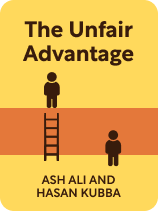

This article is an excerpt from the Shortform book guide to "The Unfair Advantage" by Ash Ali and Hasan Kubba. Shortform has the world's best summaries and analyses of books you should be reading.
Like this article? Sign up for a free trial here .
When it comes to business success, do you need both hard work and luck? What mindset should you have toward these factors?
In The Unfair Advantage, authors Ash Ali and Hasan Kubba discuss the role of hard work and luck in business. They contend that you must simultaneously believe that hard work pays off and acknowledge that luck can be the difference between success and failure. They offer advice on how to balance these two beliefs.
Continue reading to learn Ali and Kubba’s views on hard work and luck in business.
Both Luck and Hard Work Matter
While launching a successful startup requires dedicated effort, you may not be able to attain the same level of success as someone else, no matter how hard you work. So, it’s important to understand the interplay of hard work and luck in business. In reality, we all have vastly different levels of privilege, luck, and opportunity that influence what we can realistically achieve. For example, if your competitor inherited a fortune from their parents, and you’re self-funding your startup, you can’t reasonably expect your success to equal theirs.
(Shortform note: Research strongly supports the authors’ assertion that people’s different life circumstances shape their odds of becoming successful entrepreneurs. People whose parents have high incomes are more likely to become entrepreneurs, and family money is one of the primary sources of funding for startups. When entrepreneurs have strong financial support from their families, they don’t have to do the hard work of securing startup funds to survive the critical early months of development, and they have a financial safety net in case things don’t work out. Although this financial support doesn’t necessarily translate into success, it gives entrepreneurs a significant advantage.)
However, if you believe that luck is the only determining factor in success, you may become resigned, thinking that nothing you do ultimately matters, so why bother trying? To avoid this pitfall, Ali and Kubba say, you should aggressively pursue your goals with the resources you currently have to increase your chances of success—while knowing that some factors are out of your control. This determined yet realistic mindset will help you stay motivated to keep pursuing your dream, even when you encounter setbacks.
(Shortform note: Is believing in luck demotivating, as Ali and Kubba contend? Research indicates yes, revealing that people who believe in luck as a random, external phenomenon that determines outcomes are more pessimistic and anxious. In contrast, people who believe in their ability to shape outcomes tend to view challenges as opportunities. They’re also more likely to take initiative, adapt to change, and find creative solutions, thereby increasing their chances of success. Thus, the determined yet realistic mindset Ali and Kubba promote will likely improve your odds of becoming a successful entrepreneur.)

———End of Preview———
Like what you just read? Read the rest of the world's best book summary and analysis of Ash Ali and Hasan Kubba's "The Unfair Advantage" at Shortform .
Here's what you'll find in our full The Unfair Advantage summary :
- The guidebook you need if you're planning to start a business
- How to find and use your unfair advantages (everybody has some)
- The steps you must take to achieve startup success






